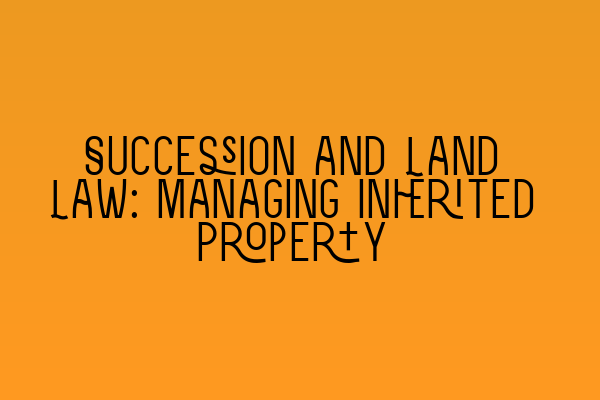Succession and Land Law: Managing Inherited Property
As a solicitor specializing in property law, it is crucial to understand the intricacies of succession and land law, especially when dealing with inherited property. In this blog post, we will explore the key aspects of managing inherited property and provide valuable insights into ensuring a smooth and successful transition.
When someone passes away, their property often becomes part of their estate. This estate will typically include various assets, such as land, buildings, and personal possessions. The process of managing the transfer of these assets from the deceased to their beneficiaries is known as succession.
Succession involves legal formalities, which differ depending on whether the deceased person left a valid will or died intestate (without a will). In either case, the distribution of inherited property must comply with the relevant laws and regulations.
If the deceased left a will, it is vital to establish its validity and authenticity. The will should outline the specific details of how their property should be distributed among the beneficiaries. As the solicitor handling the case, you will need to verify the will’s execution, make sure it meets the legal requirements, and ensure that the deceased had the capacity to make a valid will.
In cases where the deceased person died intestate, the distribution of inherited property is governed by the intestacy rules. These rules determine who inherits the property and in what share, based on the familial relationship with the deceased. It is crucial to follow these rules closely to avoid any conflicts or disputes among the potential beneficiaries.
Managing inherited property also involves understanding the various rights and interests associated with land ownership. As a solicitor, you must assess the type of property involved, such as freehold, leasehold, or commonhold, and advise your clients accordingly.
Additionally, you should conduct a thorough examination of the title deeds and other relevant documentation to determine any existing encumbrances or liabilities that may affect the inherited property. This is necessary to provide accurate advice to your clients and ensure that they understand the legal implications and obligations associated with the property.
Throughout the process of managing inherited property, it is essential to maintain effective communication with your clients, keeping them informed of each step and addressing any concerns they may have. This will help build trust and ensure a smooth and satisfactory experience for all parties involved.
In some cases, disputes may arise between the beneficiaries or other parties with a potential interest in the inherited property. As a solicitor, it is your role to resolve these conflicts amicably through negotiation or, if necessary, through legal proceedings. Your expertise in dispute resolution will be invaluable in achieving swift and fair resolutions.
To ensure success in managing inherited property, solicitors should stay updated with the latest developments in land law and succession regulations. Ongoing professional development and continuous learning are essential to provide the best possible advice and service to clients.
At SQE Property Law & Land Law, we understand the complexities involved in managing inherited property. Our team of experienced solicitors specializes in handling succession cases, providing comprehensive guidance and support to clients throughout the entire process.
If you are preparing for the SQE exams and need practice quizzes or mocks to enhance your knowledge and skills, consider checking out our related articles:
– SQE 1 Practice Exam Questions: This article provides a collection of practice questions to help you prepare for the SQE 1 exam.
– SQE 1 Practice Mocks FLK1 FLK2: Get ready for the SQE 1 exam with our practice mocks FLK1 FLK2, designed to replicate the actual exam experience.
– SQE 2 Preparation Courses: Prepare for the SQE 2 exam with our comprehensive courses, covering all the essential topics and providing valuable insights into property law and land law.
– SQE 1 Preparation Courses: Our SQE 1 preparation courses are designed to equip you with the necessary knowledge and skills to succeed in the exam.
– SRA SQE Exam Dates: Stay updated with the latest SRA SQE exam dates and deadlines to plan your preparation effectively.
Managing inherited property requires a deep understanding of succession and land law. As a solicitor, it is your responsibility to guide and assist clients in navigating the complex legal landscape. By staying informed and continuously honing your expertise, you can ensure a seamless and successful management of inherited property for your clients.
